The Ukrainian people are undergoing a mental decolonisation, rejecting the belief in Russia’s supremacy and in the cultural ties that bind the two nations. Instead, they are adopting an attitude of superiority towards the former hegemon. However, they are paying a high price for this as Ukraine faces a demographic slump, economic ruin, people’s impoverishment and war trauma. Jadwiga Rogoża, senior fellow at the Centre for Eastern Studies in Warsaw, reports how the attitudes of the Ukrainians radically have shifted since the start of the Russian invasion.
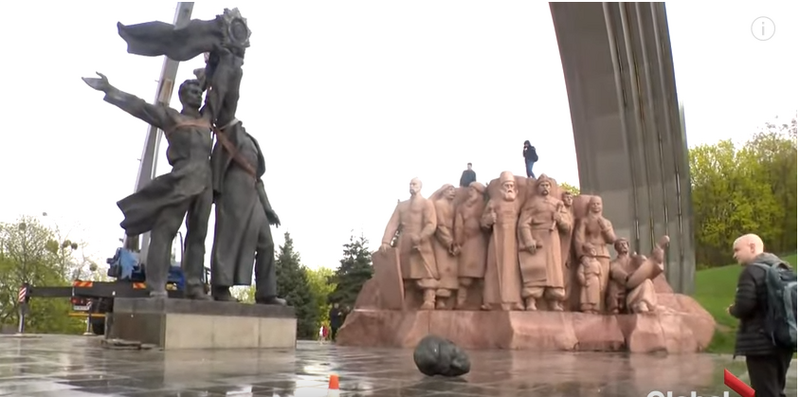 Demolition of the Soviet monument to Russian-Ukrainian friendschip in Kyiv. Screenshot from Youtube
Demolition of the Soviet monument to Russian-Ukrainian friendschip in Kyiv. Screenshot from Youtube
by Jadwiga Rogoża
The Russian invasion of Ukraine has completed the process of identity transformation and the shaping of a Ukrainian political nation. The year of war, accompanied by an all-encompassing derussification of public life, has accelerated Ukrainians’ turn towards their native history, culture, language and symbols, seen as part of the broader European context. Both of these trends began when the country gained independence in 1991 and intensified sharply after the annexation of Crimea and the outbreak of the war in the Donbas in 2014, when the state clearly defined its politics of memory and launched an all-out effort to Ukrainianise public life. At that time, the identity changes were present in a section of society, but they are now consolidating the vast majority regardless of the region, age, and language of communication.
The ultimate collapse of ‘Russki Mir’
Arguably, ‘Russki Mir’ ended in Ukraine overnight – on 24 February 2022. The war became a turning point for Ukrainian identity. The brutality of the invasion, the deliberate destruction and the suffering inflicted on the civilian population made the Ukrainian people definitively lose their sense of cultural and linguistic community with Russia. The struggle against the invader is a matter of paramount importance: it is a battle not only for territory, but also for the preservation of the Ukrainian identity and its very existence. This process of asserting independence from Russia, which had already been advancing steadily since the collapse of the Soviet Union, accelerated after 2014 and has now been embraced by an absolute majority of the population.
The war has suppressed pro-Russian attitudes – the response to these has become largely hostile, especially among younger Ukrainians. Also, the Ukrainian Orthodox Church of the Moscow Patriarchate (UOC-MP) has lost the sympathy of the faithful and only 4% of those surveyed identify with it today. There is still a certain percentage of people in the country who feel a bond with Russia and its culture, especially in the eastern and southern oblasts, but polls indicate that they are now a minority even in their own regions.
The government in Kyiv has used the invasion to cleanse politics and public life from previously influential pro-Russian forces, which had simultaneously been its political competitors: such parties have been banned, oligarchs with links to Russia have been sanctioned, and the UOC-MP is facing liquidation. This has weakened and likely eliminated pro-Russian groups from politics for a long time to come while strengthening the ruling camp that has spearheaded these changes, which are supported by the vast majority of the population.
Moral superiority is conveyed by the language used to describe Russia and its people: 'horde', 'orcs', 'rashists'
The Ukrainians are building an apotheosis of their own country in contrast to Russia. They depict the ongoing conflict as a war of civilisations: Europeans against modern-day barbarians. The Ukrainian culture, built on freedom, courage and social bonds, is contrasted with Russian culture: destructive, prioritising conquest over internal development, hierarchical, with a public consciousness reminiscent of serfdom that spawns one dictator after another. The sense of moral superiority is conveyed by the dehumanising language used to describe Russia and its people, which includes terms such as ‘horde’, ‘orcs’ and ‘rashists’, as well as the use of lower case letters when writing the name of that country and its leaders.
A mental decolonisation is rapidly taking place in Ukraine. The failure of the Russian offensive has destroyed the myths of Russia’s power and dominance over the Ukrainian state. These have been replaced by a sense of Ukrainian superiority over its neighbour as an ill-governed and backward country. This attitude is also displayed towards Russian society, moreover, many Ukrainians reject the idea of the so-called good Russians (liberal opponents of the Putin regime), arguing that most of them have soaked up the imperial ideas.
The Russocentric paradigm of historical memory, once uniform for the entire post-Soviet area, with the key role of Moscow, the sacred status of the Great Patriotic War and nostalgia for the Soviet Union, is fading away. The majority of the Ukrainian people (73%, up from 49% in 2020) have come to see the collapse of the Soviet Union as a positive event; the attitudes of those living in the eastern part of the country have seen the sharpest change (65% of respondents in those areas believe so, compared to 26% in 2020).
Chart 1. “Do you consider the collapse of the USSR as a positive or negative event?”
 Source: ‘USSR Collapse, De-russification, Maidan: How Ukrainians' Attitude to National Memory Policy Changes against the Backdrop of Russian Aggression’, Ilko Kucheriv Democratic Initiative Foundation, 20 January 2023, dif.org.ua.
Source: ‘USSR Collapse, De-russification, Maidan: How Ukrainians' Attitude to National Memory Policy Changes against the Backdrop of Russian Aggression’, Ilko Kucheriv Democratic Initiative Foundation, 20 January 2023, dif.org.ua.
Russian culture is today seen as a tool to subjugate Ukraine and to mould loyalist attitudes and the conviction that Ukrainian culture is inferior and provincial. Since the beginning of the invasion, there have been discussions about cancelling Russian culture in its entirety – both contemporary and classical (such as the works of Alexander Pushkin), including authors who were born in or associated with Ukraine (Mikhail Bulgakov, Anton Chekhov), but who are part of the Russian canon. The Ukrainian authorities are also gradually taking down Russian and Soviet symbols and memorials (monuments, street names) from the public space, removing works of Russian culture from theatres, school curricula and some libraries.
Ukrainianisation: returning to the roots
Derussification has spurred the Ukrainian people to build their identity around their native history, culture and language. The Soviet period led to these being marginalised, but the three decades of Ukrainian independence have also failed to produce effective strategies to popularise them while many citizens have remained under the influence of the narrative about the ‘superiority of Russian culture’.
After the collapse of the Soviet Union, Ukraine went through several stages of building its new, non-Soviet identity. The first, only partial stage of dismantling the communist legacy came in the 1990s, when state symbols were established, some Soviet memorials were removed and communist ideology was dropped from school and university curricula. The presidency of Viktor Yushchenko, which followed the first post-independence mass popular uprising, the so-called Orange Revolution in 2004, became the first period of the conscious creation of a Ukrainian identity, although this only involved a part of the society.
At that time, the state stepped up its politics of memory honouring events and figures that had been silenced during the Soviet period, most notably the Holodomor (Great Famine), and the leaders of World War II-era nationalist formations were awarded the title of Hero of Ukraine. The Ukrainian Institute of National Memory was established in 2006 as an institutional mechanism for implementing the government’s vision of the politics of memory.
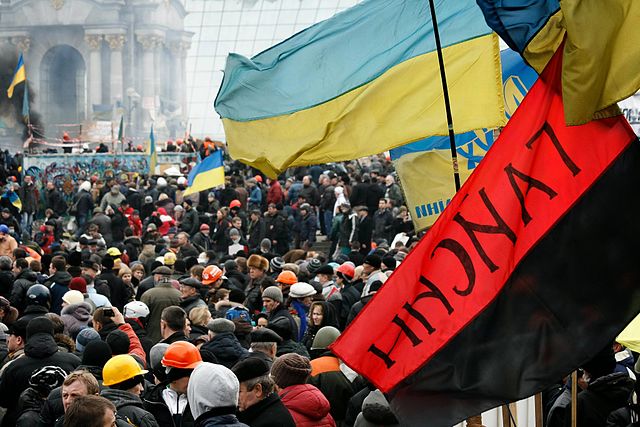 Euromaidan 'Revolution of Dignity', 19 February 2014. Picture Wikimedia commons
Euromaidan 'Revolution of Dignity', 19 February 2014. Picture Wikimedia commons
The impulses that led to profound changes in civic consciousness came with the Revolution of Dignity (2013–2014) as well as Russia’s annexation of Crimea and the war in Donbas which it provoked. The government then launched an all-out effort to enact decommunisation, to cultivate historical traditions, promote Ukrainian as the official language, including in educational institutions; it also sought to secure the country’s independence from Russia in the religious dimension (the creation of the autocephalous Orthodox Church of Ukraine in 2018).
These policies, together with the public mobilisation triggered by the need to resist the aggressor, hastened the deconstruction of Russki Mir in Ukraine and also sped up the formation of a political nation comprising citizens of different nationalities who nonetheless all declared an affiliation to the Ukrainian state. Initially, this process involved only a part of the population. Today, almost a year into the invasion, it encompasses the absolute majority.
According to a KIIS poll from January this year, 80% of respondents declare that they are firstly citizens of Ukraine, and when defining their nationality, they are much more likely to refer to the sense of connection with their country of residence than to the automatic ‘inheritance’ of nationality from their parents (a drop from 68% in 2017 to 48% in 2022). There has been an unprecedented increase in trust in state institutions, previously among the lowest in the world: in the President (three-fold, from 27% to 84%), the Security Service of Ukraine (two-fold from 29% to 63%), the police (nearly two-fold, from 30% to 58%), and the government (almost four-fold from 14% to 52%).
Chart 2. “Which nationality do you identify with?”
 Source: ‘Мова та ідентичність в Україні на кінець 2022-го’, Збруч, 7 January 2023, zbruc.eu.
Source: ‘Мова та ідентичність в Україні на кінець 2022-го’, Збруч, 7 January 2023, zbruc.eu.
Chart 3. Trust in state institutions
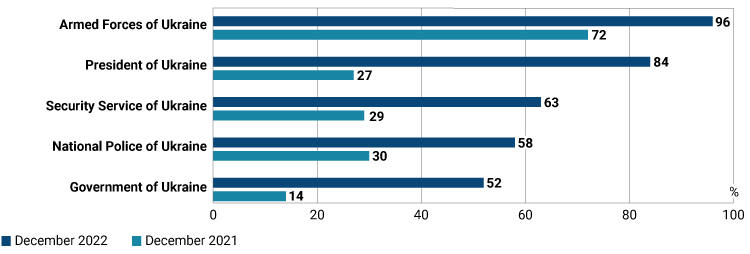 Source: ‘Dynamics of trust in social institutions in 2021–2022’, Kyiv International Institute of Sociology, 13 January 2023, kiis.com.ua.
Source: ‘Dynamics of trust in social institutions in 2021–2022’, Kyiv International Institute of Sociology, 13 January 2023, kiis.com.ua.
As a result of their effective resistance, the Ukrainian people have begun to refer to their own history as a source of bravery, the love of freedom, and affiliation with Europe. The vast majority of citizens consider it important to nurture historical memory and the slogan ‘Glory to Ukraine – glory to the heroes’ (which has its roots in the work of Taras Shevchenko and was used by nationalist circles during World War II) has become a common greeting in the media and the political sphere.
The brutality of the invasion has prompted the Ukrainian people to see the strengthening of their own identity as a matter of national security
Institutions, NGOs, activists and artists have stepped up their activities to popularise Ukrainian history, symbols and cultural achievements: the National Opera of Ukraine has declared 2023 the year of Ukrainian music, and in addition to state institutions (the Ukrainian Cultural Foundation, the Ukrainian Institute of National Memory), universities, private art galleries and individual artists are organising various artistic, cultural and historical projects as they capitalise on the interest in Ukraine abroad. The phenomenon of the Ukrainian identity has attracted worldwide attention, as evidenced by the popularity of Timothy Snyder’s lectures on the history of Ukraine as well as online courses about the country prepared on global platforms and advertised with the slogan 'Discover the culture of freedom'.
The scale and brutality of the invasion has also prompted the Ukrainian people to see the strengthening of their own identity as a matter of national security. The shaky and blurry nature of this identity as well as the traditional distrust in the state and its institutions are considered to be among the factors that have facilitated Russia’s domination over Ukraine and the subsequent phases of its armed aggression over the years. Therefore, the threat to the Ukrainian state has contributed both to its empowerment in the eyes of its citizens and to the increased importance of the issue of national identity and distinctiveness.
A history and language of our own
The war fosters the crystallisation of historical myths and these are used to mobilise society. Figures that symbolise the ‘eternal’ struggle against Russia are gaining respect, although they are reduced to a single, glorious dimension and surrounded by an uncritical cult. The best example of this is the Ukrainian nationalist leader Stepan Bandera, who functions almost exclusively as a personification of steadfast resistance to the Soviet Union, while in countries like Poland he is also held accountable for the crimes of the nationalist units against Polish civilians in wartime Ukraine.
In today’s Ukraine, Bandera is viewed positively by between 50% and 74% of citizens, depending on the survey. Over the past year, this support has soared and united the whole of Ukraine, including the east and south, which had previously been critical of him. Reports on acts detrimental to his reputation appear only in niche discussions and do not influence public opinion in general.
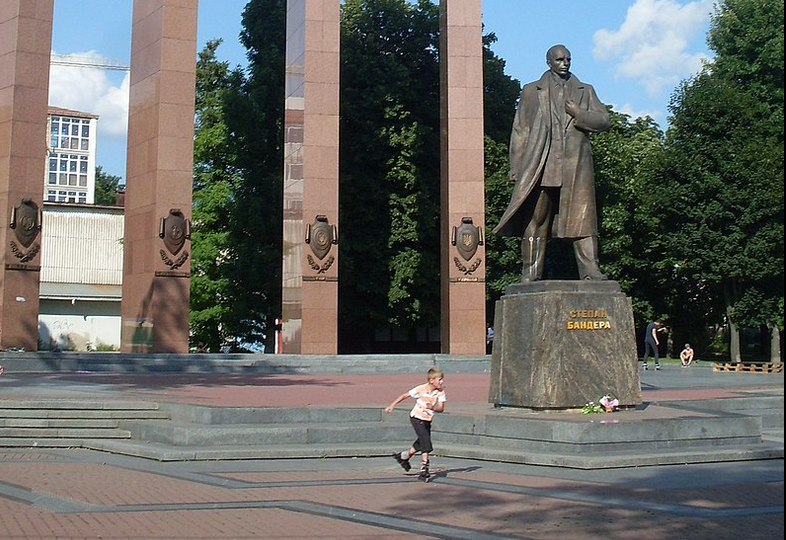 Statue to Stepan Bandera in Lviv. Picture Wikimedia commons
Statue to Stepan Bandera in Lviv. Picture Wikimedia commons
Chart 4. Attitudes towards Stepan Bandera
 Source: ‘Як трансформується ставлення українців до декомунізації, УПЦ МП та націоналізму під час війни з Росією’, Ilko Kucheriv Democratic Initiative Foundation, 13 October 2022, dif.org.ua.
Source: ‘Як трансформується ставлення українців до декомунізації, УПЦ МП та націоналізму під час війни з Росією’, Ilko Kucheriv Democratic Initiative Foundation, 13 October 2022, dif.org.ua.
The uncritical affirmation of nationalist activists also extends to figures directly responsible for atrocities against civilians, such as Commander Roman Shukhevych, the commander of UPA (Ukrainian Insurgent Army). Ternopil city is planning to erect a monument to him, while cities in the east (Kryvyi Rih, Kremenchuk, Izyum etc.) have named streets after him. Most of the Ukrainian public are discovering these figures for the first time, and are presented with an idealised image of them, in keeping with the current needs of the struggle against the occupier. This tendency is one of the reactions to the ongoing invasion, but it carries the risk of perpetuating an arbitrary, mythologised version of historical memory, which may cause tensions in relations with other countries, including Poland.
There is a risk of a mythologised version of historical memory
Hatred for imperial Russia has accelerated the Ukrainianisation of the linguistic sphere. Some Ukrainians who had previously spoken Russian on a daily basis made a principled decision after 24 February last year to switch to Ukrainian in the public sphere, and a small percentage also did so in their private lives. These processes were also seen after 2014, but the ongoing war has given them an additional, powerful boost. Currently, 41% of respondents communicate exclusively in Ukrainian, and 17% do it most of the time. One in four respondents use both languages, while those who admit that they speak mostly or only Russian account for 9% and 6% of the total respectively. Over the past five years, the percentage of those speaking only or mostly Ukrainian has risen by 8 points, while the percentage of those communicating only in Russian has decreased by 11 points.
Chart 5. Declared language of daily communication
 Source: ‘Мова та ідентичність в Україні на кінець 2022-го’, Збруч, 7 January 2023, zbruc.eu.
Source: ‘Мова та ідентичність в Україні на кінець 2022-го’, Збруч, 7 January 2023, zbruc.eu.
Even in the east and south of the country, people who use only Ukrainian now outnumber those who speak only Russian (29% and 27% respectively). Although the latter remains the language of daily private communication for many, it is gradually losing its position. This trend, even though it poses practical difficulties for large numbers of people and causes tensions within families (for example in younger Ukrainians’ conversations with their Russian-speaking parents or grandparents), seems irreversible as the youngest generations are already mostly fluent in Ukrainian.
The invasion has also hastened the transition of business (retail chains, advertisers) to Ukrainian, as regulated by the 2019 language law. The use of the state language in public institutions, at official meetings and celebrations was a law observed in the breach, but has now become an everyday practice, even a fashion, which underlines patriotism and illustrates the change of attitudes towards all things native. It has thus made the trends initiated in 2014 permanent.
The conviction that it is necessary to build a new, non-Soviet identity based on Ukrainian history and its language and culture unites various social groups, including the majority of Russian-speaking Ukrainians who previously felt some degree of affiliation with Russian culture. However, there are some disagreements and disputes over the extent and pace of derussification in individual spheres. Criticism of ‘radical Ukrainianisation’, the stigmatisation of Russian-speaking Ukrainians for ‘using the language of the aggressor’ and top-down bans on communication in Russian (e.g. an order that completely prohibits the use of this language issued by the authorities of the prestigious Kyiv-Mohyla Academy in Kyiv) comes up in public discussions and even in private conversations.
An empowered society
The crystallising identity is based on the agency of society, which underpins resistance to the invader. The dreadful war conditions have led to much greater public involvement in initiatives to defend the country and enhance its stability. Citizens, NGOs and local government structures have demonstrated tremendous potential for grassroots self-organisation, engaging in combat operations and in assistance to the military. Many volunteers, including some who had returned from abroad, rushed to the battlefront after 24 February last year. The post-2014 phenomenon of volunteer formations, especially non-military ones (medical, rescue, relief), has re-emerged. Social foundations are raising huge funds for the Ukrainian Armed Forces, for example Serhiy Prytula’s organisation raised a total of 3.8 billion hryvnias, or more than $100 million, in 2022.
Citizens, NGOs and local government structures have demonstrated tremendous potential for grassroots self-organisation
However, these campaigns would not be possible without the mobilisation of the entire society. Despite its impoverishment, contributions to support the Ukrainian military have become routine. Artists, intellectuals and celebrities are involved in these efforts and in publicising the ‘Ukrainian cause’ abroad, thus becoming social ambassadors for their country. The Ukrainians are also fighting back with ‘cultural weapons’: songs such as ‘Red Kalyna’ and ‘Stefania’ have gained popularity around the world, while jokes and memes mocking the Russians and honouring native heroes have already written a separate chapter in Ukrainian war culture.
The growing sense of agency during the war is also demonstrated by increased public interest in politics (from 71% in 2021 to 90% in 2022). The past year has been a time of consolidation around the government and growing trust in the state, but also of expectations that the leaders will ensure the effective defence of the country, implement systemic reforms and eradicate corruption, which in turn is supposed to pave the way for Ukraine’s membership in the EU. These demands are most actively voiced by the country’s traditionally active NGOs and investigative journalists, who reveal irregularities in how the state functions and schemes to scupper accession reforms.
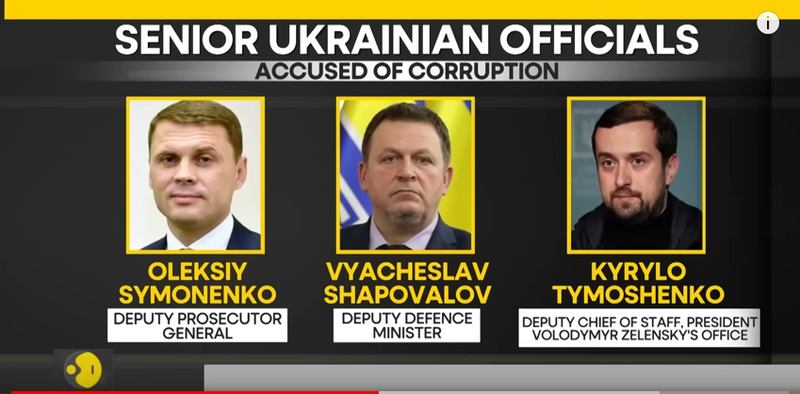 Corruption scandals revealed by investigative journalists. Screenshot from Youtube
Corruption scandals revealed by investigative journalists. Screenshot from Youtube
The critical mass of scandals at the turn of January and February, which affected even such strategic areas as the deliveries for the Armed Forces, led to heightened criticism of the government and outright denunciations of the emerging dysfunctions. Ukrainian society is also an important partner of the West in pressing the government to implement reforms. The vibrancy and dynamism of the social sphere is also confirmed by the fact that a new generation of charismatic social and military leaders, who might play an important role in the country’s post-war political life, is emerging in Ukraine under wartime conditions.
Gradual but irreversible changes
It will only be possible to fully assess the depth and permanence of the social changes taking place in Ukraine once the active phase of military operations has ended and the unprecedented popular mobilisation (which seems unsustainable in the long run) has subsided. A number of factors will influence Ukrainian attitudes: economic (specific prospects for rebuilding the country, creating jobs and providing housing), social and societal (the scale of the demographic slump and the war trauma) and political (the government policy in the areas of language, history and memory), but also the international context, i.e. the chances of real integration with the EU.
As the war looks set to drag on, new social divisions may emerge, centred around the degree of involvement in the country’s defence (those fighting on the front lines vs. those who stayed at home), personal choices (staying in occupied and attacked cities vs. leaving for safer regions or abroad) and language issues (Ukrainian-only speakers vs. Russian-speaking citizens attacked for using the ‘language of the aggressor’).
Russian attempts to reconquer the country only led to further consolidation of the Ukrainian identity
The identity-building processes, although driven by turning points in history, are inherently long-term and fluctuating. The social uprisings seen in previous decades (the Orange Revolution, the Revolution of Dignity), which provided impulses to dismantle the Soviet legacy and build a new identity, faded after a while and turned into periods of stagnation or even decline. At the same time, each of these events and the subsequent generational changes consistently pulled Ukraine further away from its Soviet past and from Russia itself.
The awareness that the country was gradually slipping out of the Moscow-controlled post-Soviet zone was one of the reasons for the successive phases of Russian invasion in an attempt to reconquer the country and derail its Euro-Atlantic course. Contrary to Moscow’s intentions, each of these phases spurred the Ukrainian state and society to pursue changes and consolidate Ukrainian identity. A return to the pre-war state of relations with Russia is almost certainly impossible, nor will Ukrainians abandon the affirmation of their own identity.
